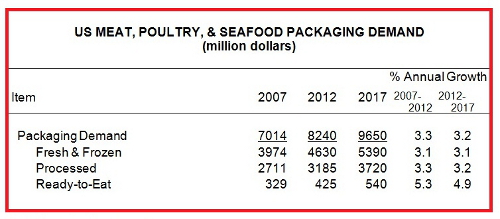
Demand for meat, poultry, and seafood packaging is forecast to increase 3.2 percent annually to $9.7 billion in 2017. Gains will be driven by increased meat, poultry, and seafood production along with accelerated foodservice revenue increases. Prospects for packaging will further benefit from the significant shift to case-ready packaging among grocery retailers as well as the growing share of smaller sized items and items that are further processed for convenience of preparation. Heightened demand for single portion and other smaller sized products will reflect the significant level of one and two person households in the U.S. as well as efforts among processors and retailers to hold down selling prices, especially in beef.
These and other trends are presented in Meat, Poultry, & Seafood Packaging, a new study from The Freedonia Group, Inc., a Cleveland-based industry market research firm.
Flexible packaging demand growth will outpace that of rigid packaging as a result of solid prospects for pouches and high barrier film, along with inroads into rigid packaging due to sustainability benefits via reduced material use and significantly lower shipping costs. Rigid packaging growth will be limited by maturity and/or competitive drawbacks in corrugated boxes, metal cans, folding cartons, and paperboard sleeves.
Pace-setting poultry packaging
Poultry packaging applications will achieve the fastest growth through 2017, driven by poultry's advantages of lower cost and a more favorable nutritional profile. Meat will continue to be the largest application though growth will slightly trail the overall average. While seafood applications will accelerate from their 2007-2012 performance, advances will lag the overall average due to the growing share of seafood demand that is met by imports.
The ready-to-eat market will record the fastest growth, driven by an expanded variety of prepared food for takeout from grocery stores and other retail locations as time-constrained consumers continue to seek meal options that are economical and eliminate or reduce preparation time. Gains in the fresh and frozen market will be fueled by the growing significance of case-ready packaging and MAP to extend the shelf life of fresh meat, poultry, and seafood. In the processed market, advances will reflect an increased emphasis on higher margin items that are designed to offer convenience.





